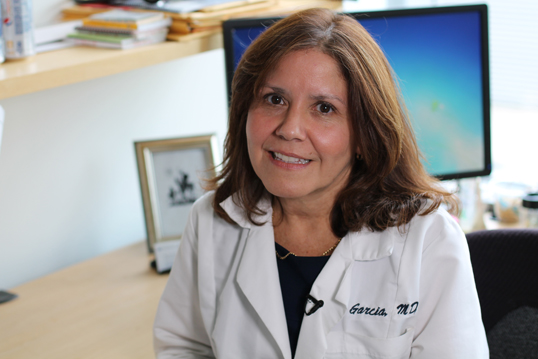
|
Maria M. Garcia, MD, MPH, the new assistant vice provost for diversity and student success at UMass Medical School, knows how it feels as an outsider. A self-described “military brat” who grew up in Puerto Rico, Dr. Garcia, professor of medicine, said she hopes to use her newly created position to serve as a mentor, advocate and coach for students and trainees from backgrounds traditionally underrepresented in medicine and the health professions, as well as to continue to develop educational programs to support them.
“We always say we want to change the culture of an institution,” said Garcia, who served as assistant dean for diversity in the School of Medicine for the past five years. “I think it’s very simple to say, but how does that happen? What do we mean by that?”
She said her goal is to create a more inclusive learning environment, fostering individual strengths and uniqueness. “And once we can do that, I think we’re going to all be stronger.”
The assistant vice provost’s role, which grew out of a focus in the Medical School’s IMPACT 2025 strategic plan on interprofessional diversity initiatives and student programs across all three graduate schools, includes partnering with the Diversity and Inclusion Office in developing and supporting educational programs to enhance diversity; serving as faculty advisor for diversity-focused interest groups; working to increase student involvement with professional organizations; enhancing mentorship opportunities for academic and professional development; and enhancing recruitment and retention of students and trainees.
Garcia will also advise on student outreach initiatives that work with non-English-speaking patients in the clinical setting and help create educational and clinical immersion experiences, such as developing a medical Spanish curriculum and offering cross-cultural clinical care of Spanish-speaking patients.
Students who speak languages other than English, particularly Spanish, have already played an important role in outreach to COVID-19 patients in the hospital who were not able to have visitors, said Garcia.
“We serve different populations of patients,” she said. “We should be incorporating materials in different languages. We should be recruiting physicians with diverse experiences, who speak different languages, and we should take advantage of the strengths those experiences bring.”
Garcia said that increasing the visibility of diversity at UMMS is one key to help with changing the culture. When researchers, clinicians and students see more and more colleagues, co-workers and learners who look like themselves, and see their achievements being celebrated, it makes UMMS a more attractive place to learn and work.
Garcia also works to create a holistic coaching program to foster the academic and professional careers of students, something she wants to build on to empower students to advance in academic medicine.
The commitment from the chancellor and the three deans to put diversity into action at UMMS is visibly present, she said, pointing to steps to recruit a vice chancellor for diversity and inclusion and a vice provost for health equity, a new position with the primary objective of recruitment and retention of faculty traditionally defined as underrepresented in medicine and the biomedical sciences.
“We’re developing tools, we’re bringing in new people and we’re looking to recruit nationally,” Garcia said.
Garcia, who joined the UMMS community in 1999, said, “It’s taken some time, but we have come a long way from where we were. That’s something I’m very excited about.”
Related story on UMassMed News:
Maria Garcia appointed assistant vice provost for diversity and student success